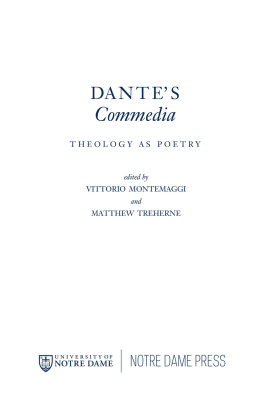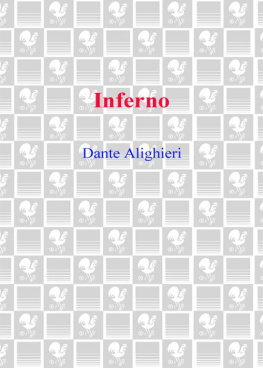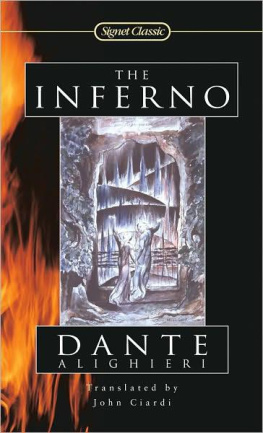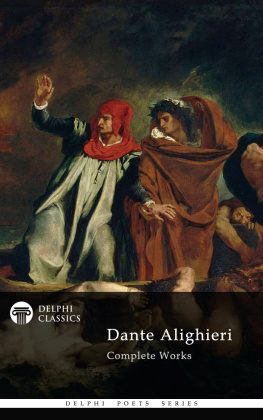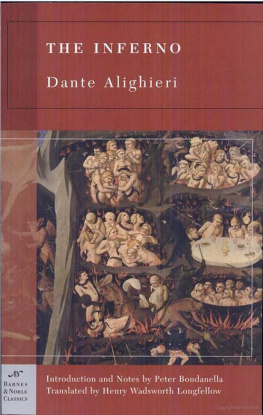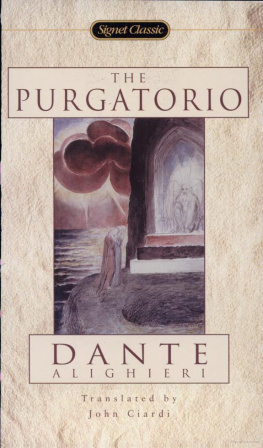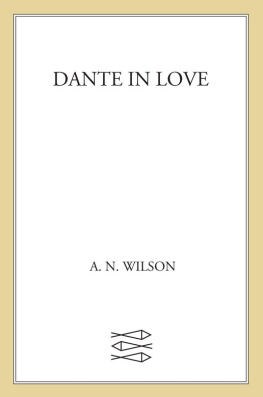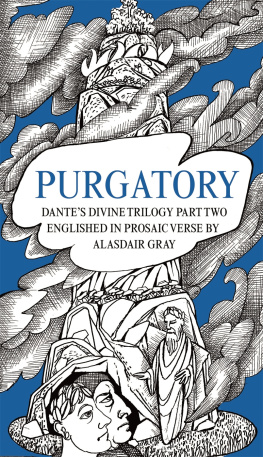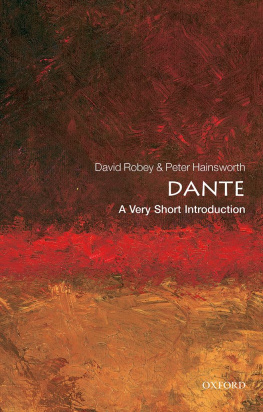
DANTES
Commedia
THEOLOGY AS POETRY
THE WILLIAM AND KATHERINE DEVERS SERIES IN DANTE STUDIES
Theodore J. Cachey, Jr., and Christian Moevs, editors
Simone Marchesi, associate editor | Ilaria Marchesi, assistant editor

VOLUME 10
Petrarch and Dante: Anti-Dantism, Metaphysics, Tradition
edited by Zygmunt G. Baraski and Theodore J. Cachey, Jr.
VOLUME 9
The Ancient Flame: Dante and the Poets
Winthrop Wetherbee
VOLUME 8
Accounting for Dante: Urban Readers and Writers in Late Medieval Italy
Justin Steinberg
VOLUME 7
Experiencing the Afterlife: Soul and Body in Dante and Medieval Culture
Manuele Gragnolati
VOLUME 6
Understanding Dante
John A. Scott
VOLUME 5
Dante and the Grammar of the Nursing Body
Gary P. Cestaro
VOLUME 4
The Fiore and the Detto dAmore: A Late 13th-Century Italian Translation of the Roman de la Rose, attributable to Dante
Translated, with introduction and notes,
by Santa Casciani and Christopher Kleinhenz
VOLUME 3
The Design in the Wax: The Structure of the Divine Comedy and Its Meaning
Marc Cogan
VOLUME 2
The Fiore in Context: Dante, France, Tuscany
edited by Zygmunt G. Baraski and Patrick Boyde
VOLUME 1
Dante Now: Current Trends in Dante Studies
edited by Theodore J. Cachey, Jr.
DANTES
Commedia
THEOLOGY AS POETRY
edited by
VITTORIO MONTEMAGGI
and
MATTHEW TREHERNE

University of Notre Dame Press
Notre Dame, Indiana
University of Notre Dame Press
Notre Dame, Indiana 46556
www.undpress.nd.edu
All Rights Reserved
Copyright 2010 by University of Notre Dame
Published in the United States of America
Library of Congress Cataloging-in-Publication Data
Dantes Commedia : theology as poetry / Vittorio Montemaggi and Matthew Treherne, editors.
p. cm. (The William and Katherine Devers series in Dante studies)
Includes bibliographical references and index.
ISBN-13: 978-0-268-03519-8 (pbk. : alk. paper)
ISBN-10: 0-268-03519-9 (pbk. : alk. paper)
1. Dante Alighieri, 12651321. Divina commedia. 2. Dante Alighieri, 12651321Religion. 3. Theology in literature. I. Montemaggi, Vittorio. II. Treherne, Matthew.
PQ4416.D392010
851'.1dc22
2009053254
ISBN 9780268162009
The paper in this book meets the guidelines for permanence and durability of the Committee on Production Guidelines for Book Longevity of the Council on Library Resources
This e-Book was converted from the original source file by a third-party vendor. Readers who notice any formatting, textual, or readability issues are encouraged to contact the publisher at .
CONTENTS
Vittorio Montemaggi and Matthew Treherne
1
Polemics of Praise: Theology as Text, Narrative, and Rhetoric in Dantes Commedia
Robin Kirkpatrick
2
All Smiles: Poetry and Theology in Dantes Commedia
Peter S. Hawkins
3
In Unknowability as Love: The Theology of Dantes Commedia
Vittorio Montemaggi
4
The Poetry and Poetics of the Creation
Piero Boitani
5
Liturgical Personhood: Creation, Penitence, and Praise in the Commedia
Matthew Treherne
6
Dantes Commedia and the Body of Christ
Oliver Davies
7
Dantes Davidic Journey: From Sinner to Gods Scribe
Theresa Federici
8
Caritas and Ecclesiology in Dantes Heaven of the Sun
Paola Nasti
9
Neoplatonic Metaphysics and Imagination in Dantes Commedia
Douglas Hedley
10
Il punto che mi vinse: Incarnation, Revelation, and Self-Knowledge in Dantes Commedia
Christian Moevs
11
How to Do Things with Words: Poetry as Sacrament in Dantes Commedia
Denys Turner
John Took
David F. Ford
The William and Katherine Devers Program in Dante Studies at the University of Notre Dame supports rare book acquisitions in the universitys John A. Zahm Dante collections, funds an annual visiting professorship in Dante studies, and supports electronic and print publication of scholarly research in the field. In collaboration with the Medieval Institute at the university, the Devers program has initiated a series dedicated to the publication of the most significant current scholarship in the field of Dante Studies.
In keeping with the spirit that inspired the creation of the Devers program, the series takes Dante as a focal point that draws together the many disciplines and lines of inquiry that constitute a cultural tradition without fixed boundaries. Accordingly, the series hopes to illuminate Dantes position at the center of contemporary critical debates in the humanities by reflecting both the highest quality of scholarly achievement and the greatest diversity of critical perspectives.
The series publishes works on Dante from a wide variety of disciplinary viewpoints and in diverse scholarly genres, including critical studies, commentaries, editions, translations, and conference proceedings of exceptional importance. The series is supervised by an international advisory board composed of distinguished Dante scholars and is published regularly by the University of Notre Dame Press. The Dolphin and Anchor device that appears on publications of the Devers series was used by the great humanist, grammarian, editor, and typographer Aldus Manutius (14491515), in whose 1502 edition of Dante (second issue) and all subsequent editions it appeared. The device illustrates the ancient proverb Festina lente, Hurry up slowly.
Theodore J. Cachey, Jr., and Christian Moevs, editors
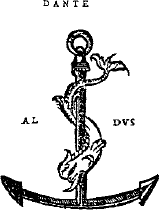
Advisory Board
Albert Russell Ascoli, Berkeley
Zygmunt G. Baraski, Cambridge
Teodolinda Barolini, Columbia
Piero Boitani, Rome
Patrick Boyde, Cambridge
Alison Cornish, Michigan
Christopher Kleinhenz, Wisconsin
Giuseppe Mazzotta, Yale
Lino Pertile, Harvard
Michelangelo Picone, Zurich
John A. Scott, Western Australia
Tibor Wlassics, Virginia
We express our sincere gratitude to the friends, colleagues, and institutions who in different ways have supported Dantes Commedia: Theology as Poetry.
In particular, we acknowledge the generous financial support received from the Burney Fund of the Faculty of Divinity and from the Department of Italian of the University of Cambridge for the conference on which the present volume is based. We are intensely grateful to the Faculty of Divinity and the Department of Italian for their continued support throughout the project as a whole. We are likewise grateful to Robinson College, Cambridgeespecially the Warden, David Yates, Mary Fuller and the conference office, and the College stafffor providing a congenial environment for the projects initial stages and for the conference. Special thanks are also due to Gillian Burrows, Ravit Capauner, Carlo Cogliati, Dee, Rosalind Paul, and Alessia Ronchetti for their invaluable help in the organization and running of the conference,
Next page
